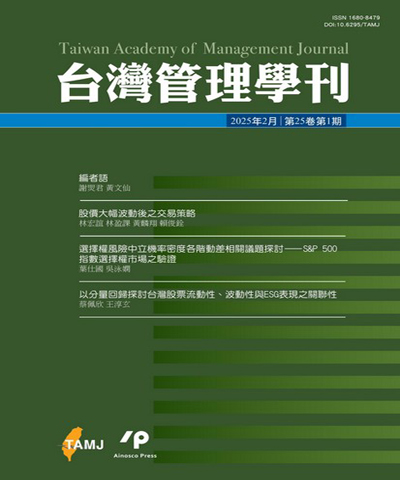
台灣管理學刊/Taiwan Academy of Management Journal
- OpenAccess
國立中興大學管理學院 & Ainosco Press,正常發行
選擇卷期
- 期刊
- OpenAccess
We apply the certainty equivalent approach to find the incentive effect of restricted stocks and stock options under the executive perspective. Our numerical simulation results show that incentive effects are different between restricted stocks and stock options under different measures. Under the delta measure, the restricted stocks have higher incentive than stock options but under the modified delta, the stock options have higher incentive than restricted stocks. We conclude that the difference of incentive measure is the reason of the inconsistent pattern of incentive effect between restricted stocks and stocks options. We define a more appropriate incentive measure, the liquidity effect, and compare the incentive effects. The result shows that the liquidity effect can explain the inconsistency caused by the delta and the modified delta. Finally, we show that the substitution of restricted stocks for stock options may not have a significant effect on the incentives for the executives.
- 期刊
- OpenAccess
本研究旨在探討台灣證券交易所公布公司治理評鑑指標後,上市櫃公司是否因更加重視公司治理機制,使得公司財務報表品質提升。證交所於2014年開始實施第一屆公司治理評鑑,首次結果揭露三個級距;隨後,第二屆增加至四個級距,第三屆更增加為七個。據此,本研究檢視在揭露級距逐次增加下,公司更加重視其結果,公司是否會因此改善治理品質。實證結果顯示,於第二屆呈現負相關情形,即隨著揭露級距增加,公司治理品質有較為改善的現象。因此,增加公司治理評鑑結果的揭露,公司會對其結果更加重視,故而改善其公司治理品質,與研究預期相符。但第三屆僅呈現不顯著負相關,可能是受到公司強制設立審計委員會,而影響實證結果。
- 期刊
- OpenAccess
本研究探討醫療財團法人舉債程度與其查核會計師性別之間的關聯,並討論醫療財團法人董事長性別在上述關係中所扮演的角色。實證結果顯示,醫療財團法人之舉債程度與其查核會計師性別具有顯著關聯,當查核會計師為女性時,會有較低之舉債程度。此外由於醫療財團法人舉債程度之高低,主要係決定於其董事會而非查核會計師,故本文進一步考慮董事長性別所扮演之角色,結果顯示當醫療財團法人具宗教背景且董事長為女性時,其舉債程度顯著高於其他醫療財團法人,但此一發現並不影響本文之結論。

